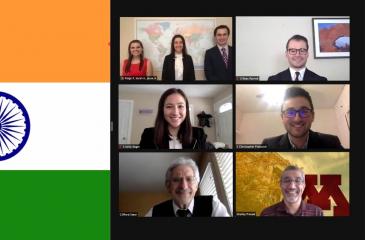The Center for Global Health and Social Responsibility’s (CGHSR) Global Health Case Competition has drawn students from multiple schools and disciplines at the University for the last 8 years. The unique interprofessional learning competition is an opportunity for graduate and undergraduate students to come together to develop innovative solutions for 21st century global health issues. The 2021 and 2020 competitions were unlike any other. With a worldwide pandemic happening in real time, there has never been a more critical need for bringing together diverse expertise to solve grand health challenges.
Shannon Benson, CGHSR student coordinator, has been involved in helping to organize the competition since 2013.
“Students crave something interdisciplinary. For years, I would get groups of students coming into my office looking for that kind of experience— they were excited about doing something with people in other fields; the case competition was just the perfect thing. Time and time again, when we ask participants what the best part of this experience was for them, they say it’s getting to work with people that they normally wouldn't be able to work with,” said Benson.
In 2021, over 80 students across 12 schools competed in 15 teams. Each team had students from at least three UMN schools and colleges. There was broad representation from the health sciences, as well as the College of Liberal Arts, the Humphrey School, the Carlson School of Management, the College of Food, Agricultural and Natural Resources Sciences, and the College of Science and Engineering.
A Case Competition with Real World Implications
Former student, turned coach, and now judge, Mateo Frumholtz, ‘19 MPH, returns each year to be a part of the weeklong activities.
“I keep coming back because the competition is an opportunity for students to step outside their roles as academics and put theory into practice. Learning about ethical frameworks is important, but implementing that process and thinking through the details of how that is operationalized is an experience you don’t get in the classroom,” said Frumholtz, who is an epidemiologist at the Minnesota Department of Health. “I’m involved in the COVID response at the state level, and in a way, I see many of these problems as mini case competitions, but with real world implications. When my colleagues and I competed in 2019, our case was responding to a pandemic caused by a novel coronavirus. Low and behold, a year later I find myself working on the response to a novel coronavirus. Although the nuances of the scenarios are different, the competition helped expose us to what kinds of things we need to think about when facing public health problems,” said Frumholtz. The case scenario for this year’s competition centered on a hypothetical outbreak of an infectious disease during the 2023 Cricket World Cup in India. Teams analyzed the case and proposed their recommendations. While normally the competition takes place in a one day-long event, this year, the first round was done with a pre-recorded video presentation and the final round was live on Zoom in front of a panel of judges.
Teams are coached by a faculty or staff member. Clifford Steer, MD, professor of medicine and the director of the Physician-Scientist Training Program, has served as a coach for eight years.
“I thoroughly enjoy working with CGHSR. The case competition is academically very stimulating, and the competition itself is friendly and lots of fun,” said Steer. “Perhaps most importantly, the case competition prepares students going into a myriad of different careers in many ways—personal growth, competition, collegiality, thought provoking cases, and the ability to stand in front of a group of judges and learn how to put your best foot forward.”
“The case competition not only prepares students for a career in global health, it prepares them for a career in life,” said Steer. Students gain simulated professional experience while building a network of interdisciplinary peers and future colleagues. This year’s winning team is composed of Jesse Abelson, Kelly Reger, and Christopher Prokosch from the Medical School, Sarah Kenney from the College of Veterinary Medicine, and Paige Palomaki and Rees Parrish from the dual-degree Veterinary Medicine and Masters of Public Health program. In late March, they will go on to compete virtually at the 2021 International Emory Global Health Case Competition.
“I have long been a proponent of straying from the silos many health professions put themselves in and encouraging interdisciplinary collaboration to find the best strategies to advance our goals,” said Palomaki. “The Global Health Case Competition really showed me firsthand how valuable it is to work with a team full of diverse backgrounds, and provided excellent practice in approaching a complex situation with an inclusive systems-thinking mindset.”



